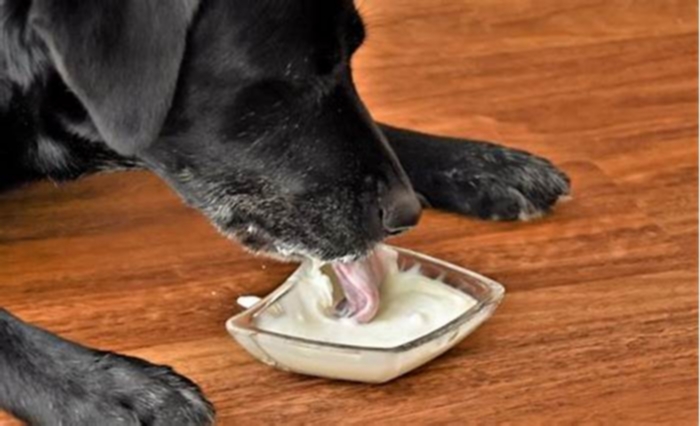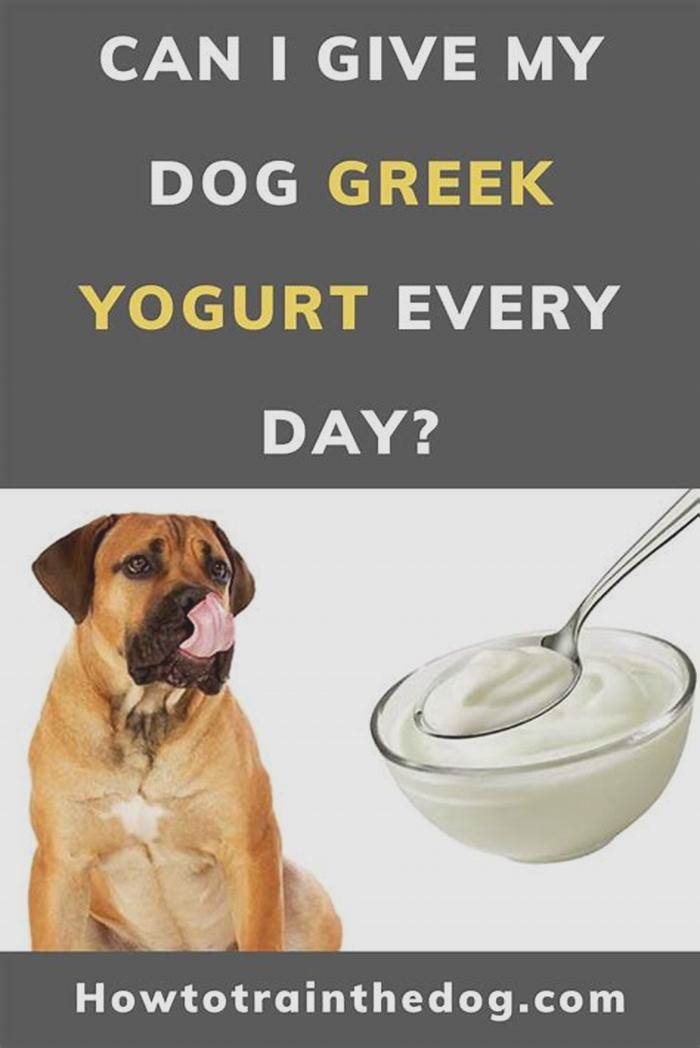Can I give my dog Greek yogurt every day

Can dogs eat yogurt?
Is yogurt safe for dogs?
Yes, yogurt is a safe, tasty treat for dogs. Adding some to your dogs kibble could be a way of incorporating a new flavor and texture without the added calories. Its also an easy way to introduce more water to your pets diet.
However, yogurt contains lactose that may trigger an adverse reaction in lactose-intolerant dogs. Some yogurt varieties also contain additives that may be harmful to dogs. Even with the health benefits that dogs can get from eating yogurt, certain precautions must still be observed to make sure that it can be safely shared with your canine buddy.
Why Yogurt is Good for Dogs
Yogurt contains substantial amounts of calcium, protein, zinc, and other nutrients. These are essential nutrients that play an important role in the growth and development of tissues and various physiological processes in the body.
Yogurt contains probiotics. These are beneficial microbes that promote and support the health and integrity of the gastrointestinal (GI) tract. Probiotics are a combination of live beneficial bacteria and/or yeasts that naturally live in the dog's gastrointestinal tract. A thriving population of good bacteria will discourage bad bacteria from overwhelming the GI tract and causing disease. Good bacteria can help improve intestinal health which is an important factor in maintaining a stronger immune system.
Also, beneficial bacteria can help break down lactose in the gut so its easier to digest.
While these benefits may be enjoyed by your dog by giving small amounts of yogurt occasionally, many vets still recommend a probiotic supplement that is specially formulated for dogs. The number of probiotics in yogurt is not enough to have significant benefits, health-wise, for dogs.
The Dangers of Feeding Your Dog Yogurt
Lactose in Yogurt
Yogurt comes in various flavors, including plain yogurt. While any of these types can be given to dogs, lactose-intolerant dogs have difficulty digesting yogurt, milk, and other dairy products because their bodies lack the enzyme lactase that can help convert lactose into simple sugars so it can be used in the body. Without an efficient way to digest and metabolize lactose, a lactose-intolerant dog may suffer from digestive upsets and exhibit symptoms such as diarrhea, vomiting, and excessive gassiness (flatulence).
If your pet is showing any of these symptoms after consuming some yogurt, you should call your vet.
Fat Content of Yogurt
Another important concern associated with yogurt is its fat content. Even if your dog is not lactose intolerant, regular consumption of yogurt can increase your pets risk for obesity. Too much fat in the diet can also lead to pancreatitis, which is a serious medical issue that is characterized by the inflammation of the pancreas and can be fatal.
Yogurt with Artificial Sweeteners
Some types of yogurt have an added artificial sweetener like xylitol, which is a sugar substitute. However, xylitol is toxic for dogs. Consumption can lead to liver failure because xylitol accumulates in the liver instead of being excreted from the body.
Any yogurt product containing artificial sweeteners or labeled low fat or low calorie should not be given to dogs.
Sugar in Yogurt
Many yogurt varieties contain high amounts of sugar which can wreak havoc on your dogs system. Even yogurt with fruit is not recommended for dogs because these frequently have added sugary syrups. Over time, too much sugar intake can increase a dogs risk of important health issues like diabetes, obesity, and dental problems.
Chocolate-Flavored Yogurt
Chocolate is toxic to dogs. Avoid giving even a small amount of chocolate-flavored yogurt to your dog.
You should make a habit of reading product labels to make sure that you are giving something to your pooch that is safe and healthy.
To protect your dog from adverse effects, always give yogurt in moderation. If its your dogs first time eating yogurt, start by offering a small amount of plain yogurt to see if he exhibits any reactions, including symptoms of lactose intolerance - diarrhea, vomiting, and gassiness.
If there are no problems, yogurt can be given in small amounts as an occasional treat. You can give yogurt directly or try mixing some into your dogs food.
What is the best type of yogurt for my dog?
When choosing yogurt for your dog always look for the following:
- Yogurt varieties that are plain and free of additives, including xylitol and fruits
- Non-fat or low-fat
- Naturally flavored
- Yogurt with active live cultures, such as Greek yogurt
How much yogurt can my dog eat?
Yogurt is not a basic dietary component for dogs. Like other human foods, its given as an occasional treat and that entails sticking to the 10% treat rule. This means that calories from treats should not exceed more than 10% of a dogs total calorie intake every day.
The appropriate serving size of yogurt for dogs is based on several factors which include the following:
- Size
- Weight
- Underlying medical conditions
- Activity level
- Spay or neuter status
- Daily calorie intake
Can dogs benefit from the probiotics in yogurt?
While probiotics in yogurt are good for dogs, the amount that youll be giving your dog on a daily basis (following the 10% rule) wont be enough for your pet to enjoy the many benefits of probiotics from active cultures. Its best to consult with your vet who can recommend a probiotic supplement that is specially formulated for dogs. Dogs can certainly benefit from the probiotics in yogurt, but there are more efficient ways to supplement your dogs diet.
Is Greek yogurt safe for dogs?
Yes, Greek yogurt is safe for dogs, as long as its free of xylitol and other additives. Its thicker texture may appeal to some dogs. Greek yogurt contains active live cultures of probiotics and has lower lactose levels compared to regular yogurt.
The process of making Greek yogurt is different from most yogurt varieties. It undergoes a straining process to remove most of the liquid, leaving behind a significantly higher protein level compared to plain yogurt.
Read more:
Can dogs eat tofu?
Need to speak with a veterinarian regarding your dogs diet or another condition?
Click here to schedule a video consult to speak to one of our vets. You can also download the FirstVet app from the Apple App Store and Google Play Stores.
Can I Give My Dog Yogurt Every Day?
Yogurt, especially plain Greek yogurt, is a super healthy snack for humans.
Add some berries, granola, and some seeds, and you have a tasty breakfast or meal on the go thats full of nutrients!
If youre a fan of yogurt and keep it around the house, you may be wondering: Is it okay to give yogurt to dogs, and if so, can I give my dog yogurt every day?
After all, were advised to eat yogurt to get a daily dose of probiotics, so that must mean its okay for our dogs, right?
Heres how your dog can get the most out of the health benefits that yogurt has to offer, without getting sick or throwing their diet off-balance.

Benefits of yogurt for dogs
The health benefits of yogurt for dogs are mostly similar to humans.
Yogurt contains calcium, protein, and other nutrients that are great for your dogs bones, hair, skin, and coat.
If your dog is on any sort of antibiotic, it can be particularly beneficial for them to take a spoonful of yogurt a couple hours after taking their medication.
This will help keep the helpful bacteria in their gut balanced while the antibiotic does its work.
If your dog has any sort of digestive issues, which you can usually tell from constipation, diarrhea, a grumbling tummy, or gassiness, yogurt can fix that, too.
Just make sure you arent giving your dog too much yogurt too often because that can aid their digestion a little too much.
Yogurt can also help your dog avoid a yeast infection after their course of antibiotics.
If you have a dog whos prone to ear infections (this is especially common in long and floppy-eared breeds, such as Beagles, Bloodhounds, Cocker Spaniels, and many more), yogurt can help heal and prevent these infections.
Most dog ear infections are caused by an overgrowth of yeast and bacteria, and yogurt helps to naturally restore an acidic environment in the body that makes it difficult for these organisms to grow.
Recommended reading: How to Treat Ear Infections in Dogs at Home
Can I give my dog Greek yogurt?
Yes, dogs can absolutely eat Greek yogurt!
In fact, plain Greek yogurt is probably the best, safest, and healthiest option when considering feeding your dog yogurt.
This is partially for the same reasons that Greek yogurt is so healthy for humans it contains the probiotics that aid digestion, and keep the helpful bacteria in the gut balanced.
While some humans may not like the taste of plain Greek yogurt, dogs typically love it.
Can dogs eat yogurt with fruit?
Yes, however, this isnt the healthiest option for them.
Dogs dont need the processed sugar or flavor additives to entice them to eat yogurt, and in fact, those are bad for them since it can lead to teeth cavities, weight issues, diabetes, and digestion problems.
Some fruits can even be toxic to dogs, so its best to stick with plain Greek yogurt and pair it with a small piece of fruit that you know is safe if you want your dog to enjoy the treat.
Also, never feed your dog any type of yogurt that lists xylitol as an ingredient. Xylitol is a sweetener used in many sugar-free or low-sugar human foods, including yogurt, and its highly toxic to dogs.
If your dog is overweight, try a low-fat version of Greek yogurt. Otherwise, the regular plain version is fine.
Can I mix yogurt with my dogs food?
Luckily, most dogs love the flavor of plain Greek yogurt, so you shouldnt have any problems getting them to eat it.
You can feed your dog yogurt by spreading it across their kibble or mixing it into their wet food. You may also serve it to them separately in a little dish on the side of their regular food or as a treat.
Like any new food, you should introduce it to your dog very slowly and gradually and work your way up to the full amount so as not to upset their stomach.
Can I give my dog yogurt every day?
Although your dog can have yogurt every day, they may not need it.
If they seem to be having bowel movements too frequently or passing loose stools, its time to cut back on the yogurt.
Your dog can have one to three spoonfuls of yogurt per day, depending on their size: one spoonful for small dogs, two for medium dogs, and three for large dogs.
Can dogs have too much yogurt?
In general, dogs shouldnt really have dairy at all, the exception being yogurt and kefir.
This is because their digestive systems arent designed to handle milk or lactose past their puppy days. Also, just like humans, some dogs are lactose intolerant or lactose sensitive.
If you feed your dog yogurt and notice it consistently upsets their stomach in any way (causes gassiness, diarrhea, lethargy, excessive water intake, or vomiting) then its probably not the best choice for them.
If you really need to find a way to give your dog probiotics, talk to a vet or holistic pet care provider about working supplements or other foods that contain good bacteria1 into your dogs diet.
In summary
Most dogs can handle small amounts of plain Greek yogurt every day. The proper serving size is between one and three tablespoons, mixed into their regular food or served separately.
There are many health benefits your dog can gain from eating yogurt, such as improved digestion, preventing and healing ear infections, and keeping the body balanced during a course of antibiotics.
However, if your dog becomes sick from yogurt, they may be lactose intolerant and shouldnt continue to eat it.
Sources
- Homemade Probiotics For Dogs: Their Benefits + 5 Simple Recipes Veterinarians.org
Healthy Foods Checklist: Yogurt for Dogs
While most dog foods on the market dont contain yogurt, the yummy dairy product may provide some nutritional benefits for your dog as a meal additive.
Plain, low or non-fat yogurt provides probiotic benefits and serves as an excellent source of calcium for our canine companions. Adding a small spoonful of yogurt to your dogs regular kibble at mealtime can provide digestive benefits and even help your dog stay full longer.
If you decide to feed yogurt to your dog, make sure to read ingredient labels carefully. Avoid flavored yogurts that are packed with sugar, and never feed yogurt that contains the ingredient xylitol, an artificial sweetener that is toxic for dogs. Its also important to avoid yogurt that is chocolate flavored, since chocolate is also poisonous to dogs.
Before making yogurt a regular part of your dogs diet, consult your veterinarian to ensure proper serving suggestions.
Some dogs have a harder time digesting dairy products, so keep an eye out for any signs of lactose intolerance. These may include diarrhea, gas, and vomiting. If your dog displays any of these symptoms following yogurt consumption, follow up with your veterinarian.
See Also









